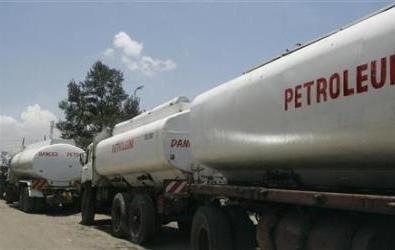US tells Kiir to alternatively transport oil by trucks
January 14, 2013 (JUBA) – A delegation of US Senators have urged President Salva Kiir Mayardit of South Sudan to alternatively begin to truck his country’s oil to the international market through Ethiopia instead of waiting for Khartoum to honour its agreements on oil transport.

The Senators who visited Juba this week include Senator Steve Pearce of New Mexico carrying the message which urged Kiir to immediately transport its oil by trucks, saying Khartoum’s act of stopping the flow of oil “doesn’t make sense.”
The Senators, who later gave statements to the state-owned South Sudan Television (SSTV) on Sunday, said their government would support the new alternative initiative to truck the oil to the international market in order to generate a significant amount of revenue for the country’s economy.
Senator Steve Pearce questioned the logic why South Sudan with such huge resources should suffer economically.
Before exporting oil to Ethiopia from Upper Nile State, South Sudan needs to construct a tarmacked road to connect Upper Nile and Ethiopia which will be able to withstand the frequent heavy traffic of big oil trucks.
The road to connect Upper Nile state and Gambella region of Ethiopia was one of the government’s infrastructure priorities roads, as well as the Juba-Nimule road, which connects South Sudan and Uganda. Both were chosen because of their economic importance.
The construction of the road has not taken off, however, because of financial constraints which the government is trying to address.
The Ethiopian government had already constructed a paved road connecting its western part of Gambella region and the capital, Addis Ababa, but are awaiting South Sudan to complete its part in order to utilize their road.
South Sudan signed an agreement in February 2012 with Kenya and Ethiopia and to construct the Lamu Port Ethiopia-South Sudan Transport Corridor (LAPPSSET) infrastructure project, which is expected to cost 25 billion US dollars.
The project aims to create a regional rail, road and port facilities across the three countries.
In January 2012, landlocked South Sudan ordered an oil export shutdown after failing to reach an agreement with Sudan over the terms of using the oil exportation facilities in the north. At the time Juba accused Khartoum of “stealing” an estimated $350 million worth of its oil.
However, in September 2012 the two countries reached a deal allowing the resumption of oil exportation but Sudan says the pumping of South Sudanese production can only start when the Juba government disengages with Sudanese rebels.
(ST)
